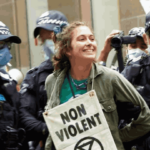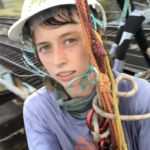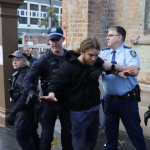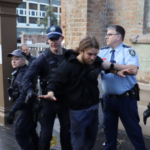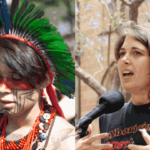Officer Pulls Firearm on Activist: Disrupt Burrup Hub’s Jesse Noakes on Escalating Police Response

That a WA police officer felt empowered to draw his gun and point it at a 21-year-old climate defender seated behind the wheel of his car, and not being in the act of committing a crime, shows that the campaign on the part of authorities to criminalise those raising the climate alarm is on track.
That the police van that pulled in front of Emil Davey’s car on a street in the affluent Perth suburb of City Beach at 10.20 pm to block his vehicle was unmarked, so the trigger-happy plainclothes officer was not immediately identifiable as police on pointing his gun, is more than disturbing.
That Davey also happens to be a climate defender who has come under the scrutiny of WA police since he stormed Optus Stadium during a May AFL game in Perth, whilst waving a flag that read Disrupt Burrup Hub, drawing attention to the climate defence campaign, was no coincidence.
Indeed, that this extreme escalation in police tactics towards climate defenders in WA came the night prior to Disrupt Burrup Hub having planned to stage a protest involving one 19-year-old woman in front of Woodside CEO Meg O’Neill’s house can neither be put down to a case of chance.
Dehumanising the messenger
On the day after the incident, as 19-year-old Matilda Lane-Rose approached O’Neill’s City Beach house, alone and holding a can of spray paint, she was descended upon by around a dozen WA counterterrorism police officers, even though the solo nonviolent action had not been publicised.
The young activist was planning on sending a message of protest regarding the climate hazard being wrought by Woodside’s Burrup Hub gas megaproject. Lane-Rose was then arrested and charged with conspiracy to commit an indictable offence and was hit with a set of draconian bail conditions.
A concerted crackdown on climate defenders has been escalating nationwide ever since the NSW government passed laws targeting disruptive nonviolent protests in April last year, which was further accompanied by NSW Police Strike Force Guard: a unit specialising in climate defenders.
Tasmania and Victoria followed suit with gaolable offences passed last August, while the South Australian opposition leader suggested such laws on the radio one morning in May and by noon that same day, the state’s lower house had passed legislation containing the since enacted laws.
Climate defenders in these states have since seen raids, arrests, remanding, extreme bail conditions and prison sentences becoming par for the course. And despite no similar severe antiprotest law being passed there, WA climate defenders have been subjected to the same escalation in policing.
An escalation on all fronts
As the WA protest group puts it, Burrup Hub consists of gas and fertiliser plants, as well as gas fields off the WA coast, which threaten the UNESCO-nominated Murujuga rock art site with its emissions, along with the future of all homes on Earth with it set to spew out 6 billion tonnes of CO2 by 2070.
Although a relatively new group, Disrupt Burrup Hub has caused a distinct splash upon the national psyche this year, ever since two of its members defaced the iconic Australian painting Down on His Luck in the Art Gallery of WA in January.
And whilst the artwork was not permanently harmed, the same can’t be said for the world’s largest and oldest collection of petroglyphs at Murujuga, as Woodside’s mass emission’s hub is already irreparably damaging the sacred site on an ongoing basis.
Sydney Criminal Lawyers spoke to Disrupt Burrup Hub media advisor Jesse Noakes about the implications of police pulling a firearm, how it’s just one amongst rising incidents of extreme climate policing, and that if people don’t take heed now, the disruptions will soon be all-encompassing.
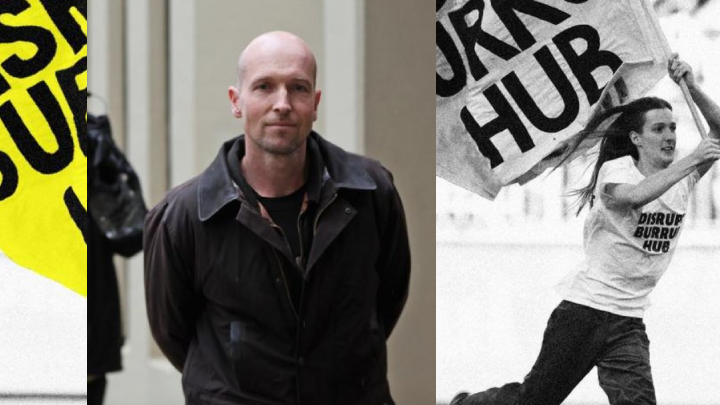
The case of a WA police officer pulling a gun on a Disrupt Burrup Hub supporter was a clear escalation in the response of WA law enforcement to climate defenders.
However, whilst this life-threatening response is extreme, so have been some other responses WA law enforcement has been taking to Disrupt’s direct actions.
As you’re well aware, Jesse, other states have been enacting draconian laws, carrying prison time, in an attempt to stop disruptive nonviolent climate protests.
So, how do you consider the gun incident? And how would you put the response in WA into the context of what’s happening more broadly across the country?
In relation to the 21-year-old campaigner having a gun pulled on him by police conducting a stop and search using an unmarked vehicle, the day before a protest that the 21-year-old didn’t even attend, has been traumatising.
He’s a music student at the Western Australian Academy of Performing Arts. He’s only a few years out of school. And in recent times, he’s been engaged in peaceful climate protest, trying to stand up and send a message about his future.
So, this incident and others like it are having an emotional impact on young peaceful climate campaigners, who are just trying to demand their government protect them against what projects like Woodside’s Burrup Hub are going to do to the world they’re inheriting.
In the context of recent claims about intimidation, harassment and bullying behaviour, due to our group targeting the Woodside CEO’s home, the fact is that this person who’s been traumatised in the recent incident, has also had his place raided by WA police twice in the past month.
The police have been doing this to effectively protect Woodside’s commercial interests and interrupt the work this campaign is doing to disrupt the Burrup Hub.
At this point, the police are effectively acting as private security for Woodside Energy, and the incident the following day, where one 19-year-old woman with a spray can was ambushed by more than a dozen counterterrorism cops out the front of the Woodside CEO’s house, is about the most acute distillation you could get of the extreme lengths that the state will go to protect fossil fuel interests from any kind of scrutiny.
This is a concerning escalation, and as you’ve mentioned, this forms part of a nationwide clampdown on climate protests, which is occurring as the stakes are getting more serious and the climate crisis accelerates.
The fossil fuel interests are supported by the authorities, as they double down on the draconian response and the use of police overreach surveillance and monitoring of peaceful campaigners, with interference in their daily lives and their capacity to communicate.
WA has almost become the pointy edge of that wedge. What we have seen in recent months here is a rapid escalation by the WA police at the behest of the government and, ultimately, Woodside, in response to what is fundamentally a group of young people who are desperately concerned about the impact of Woodside’s Burrup Hub.
These young people are terrified over what it means for their future. It should be a concern for every Australian.
One gun being pulled by police in City Beach could be dismissed as an isolated incident were it not for the fact that it’s just the latest in this extraordinary chain of raids, surveillance, police operations and stings on peaceful climate defenders. It’s really troubling.
So, the 21-year-old was pulled over by police the day before the protest out the front of the CEO’s place. So, had you been advertising the action?
Absolutely not. The police had clearly been monitoring this campaign for a significant time prior and had extensive foreknowledge of what was planned.
The police were well aware there was no prospect or intent to enter the property. And the police were actually camped out inside the home the night prior to the protest and were waiting there for the 19-year-old with a spray can and a message about her future.
The protest was intended to be the one 19-year-old woman sending a message to the Woodside CEO about Burrup Hub.
I was there because, as you would have heard, I was conducting a Four Corners television crew to capture the action, as part of a story that they’re reporting on climate protests, which has been well publicised now. And there was one other person there to take photos.
So, three campaigners were arrested: the 19-year-old, myself as media advisor and another member of the media team.
Then there were more than a dozen counterterrorism police who were lying in wait when we all arrived.
Why are you protesting the Burrup Hub expansion? How would you place it in the broader context of the climate crisis?
Woodside’s Burrup Hub is the biggest fossil fuel project in Australia. It’s the largest gas hub in the southern hemisphere.
If Woodside’s Burrup Hub were a country, it would be the seventh largest exporter of LNG in the world.
LNG is obviously a fossil fuel that’s directly contributing to and driving the climate crisis, and Woodside’s Burrup Hub will emit 6 billion tonnes of CO2 over the next 50 years.
Not only that, Woodside’s Burrup Hub is situated right on top of the oldest and largest rock art site in the world.
Murujuga is nominated for UNESCO World Heritage status, as it contains more than one million sacred rock art sites, some of which are more than 50,000 years old.
The emissions from Woodside’s Burrup Hub are not just directly driving the climate crisis that leads to the fires, the floods and the hurricanes that threaten so many people’s homes, but it’s also threatening to completely erode that rock art that is so sacred to traditional custodians and should be sacred to all of us.
It’s a megaproject that has massive ramifications for all of us, and for Meg O’Neil to suggest her home is somehow completely off limits, when that mansion she lives in and the Maserati that’s parked in the garage is directly paid for by the profits of Woodside’s Burrup Hub, which directly threatens the homes of every single one of us and, ultimately, planet Earth and all our collective future.
While targeting someone’s personal home, even if they are a CEO of one of the largest fossil fuel companies in the world, maybe a transgression, so is what that house represents and what the person who lives there does for a living.
One can query the method or tactics, but one should never forget or resile from what the message of the protest is and was, which is to say that the Burrup Hub and Woodside’s actions on Murujuga are directly threatening everyone’s home.
As an example, we’ve seen in Maui, over the last few days, extraordinarily catastrophic climate-driven bushfires that have killed what looks like more than 100 people and destroyed thousands of homes.
Woodside CEO Meg O’Neill labelled DBH extremists for protesting outside her home. And the WA police has been treating Disrupt in a manner similar to that of how law enforcement deals with terror suspects.
How do you consider the way state police are treating DBH?
The suggestion that the integrity of the home is unimpeachable and unchallengeable clearly doesn’t apply to climate campaigners, because the Disrupt Burrup Hub climate protesters have claimed more than a dozen counterterror police raids or home invasions, over the last several months.
More than half a dozen vehicles have been stopped and searched. More than 30 devices – phones and laptops – have been confiscated indefinitely by WA police, who demand access to those devices, and charge campaigners who won’t provide it.
So, when you’ve got young families whose homes are constantly raided by WA police, you’ve got young people under constant, ongoing and traumatising surveillance from WA police, and when these police are directly acting to protect Woodside’s interests and stop scrutiny of the Burrup Hub, it’s clear that the response from authorities to defend fossil fuel power in this state is significantly more extreme than one 19-year-old with a spray can outside a mansion in City Beach.
Again, she was met with a wall of counterterror police. One 19-year-old with a spray can versus more than a dozen militarised armed counterterror cops. Who’s more extreme there?
And who, to be honest, is provoking more intimidation in whoever is inside that house? Is it the teenager or is it the dozen armed tactical terror cops inside the house?
It is clear to any reasonable person where the extremism does arise, and who’s terrorising who here.
And it’s pretty clear that the terror, as usual, is on the part of the state and not of the people, who are standing up for their collective future.
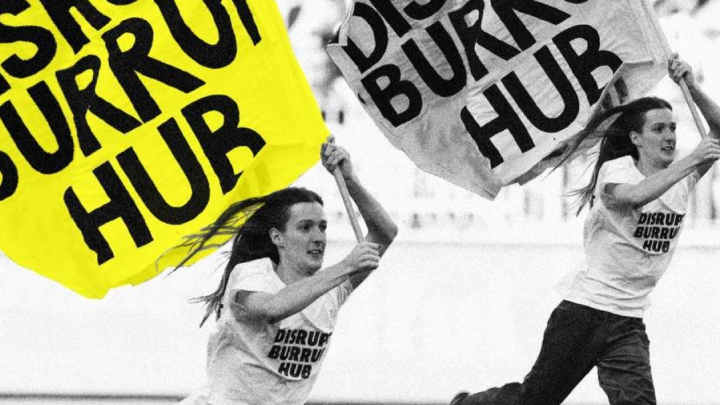
And would you say this scenario you’ve just summed up is something we’re seeing on a global scale?
Yeah, that’s clear. There are groups in the UK, Germany and throughout Europe, who have sustained staggering crackdowns, with new legislation introduced in London last year that has sent multiple people to prison for two-three-four years and led to deportations.
There’s more than one hundred people currently incarcerated in the UK for peaceful climate protest.
While on the east coast of Australia, we’ve certainly seen what’s been happening to climate protesters over there.
Violet CoCo is one notable example. She was imprisoned for briefly blocking a lane of traffic, with spurious allegations from police that fell away under scrutiny.
Clearly, across the world, or at least the western world, we’re really seeing a crackdown on civil liberties and the right to protest.
What’s driving that is the lack of recognition on the part of the state that their position is completely untenable, that the future is increasingly unstable and that more and more people will be taking these actions.
So, the state is desperately trying to fend off, or preempt, a rising wave of civil resistance or civil disobedience, because it knows that no one is buying the bullshit.
We all know what’s coming down the line. We know that projects like Burrup Hub are directly driving us toward extinction.
And so, these legislative crackdowns, these punitive measures, police overreach and intrusions into the lives of peaceful protesters are clearly just the vanguard: the first line of defence from a collapsing fossil fuel infrastructure.
WA is a state that is built on fossil fuel and extractive capital, so it’s entirely and predictably at the forefront of that.
It’s an extremely small number of younger people who are said to comprise this extreme terror threat right now, but this is just a prelude for what’s coming next, which is more people, more protests and even more civil disruption, because that disruption is coming one way or another.
It’s just a question of who’s in control: the state or the people.
So, Jesse, in closing, why do you say that the larger disruption you’ve just described is inevitable?
The climate crisis promises the inevitable destruction of everything we know, love and are currently reliant upon.
As things stand now, the status quo is that we’re heading toward disruption at an unimaginable degree and scale in every aspect of our current existence.
So, any temporary disruption now from people trying to head that disaster off and sound the alarm about what’s coming for all of us, is a drop in the ocean of the civilisational disruption and destruction that the climate crisis promises within decades – if not years.
A bit of a disruption now is a cure against colossal widespread disruption in years to come.
So, one way or another, there’s going to be disruption. It’s just a question of whether it’s of the temporary curative good kind or the planet-destroying civilisation-ending bad kind of disruption.



